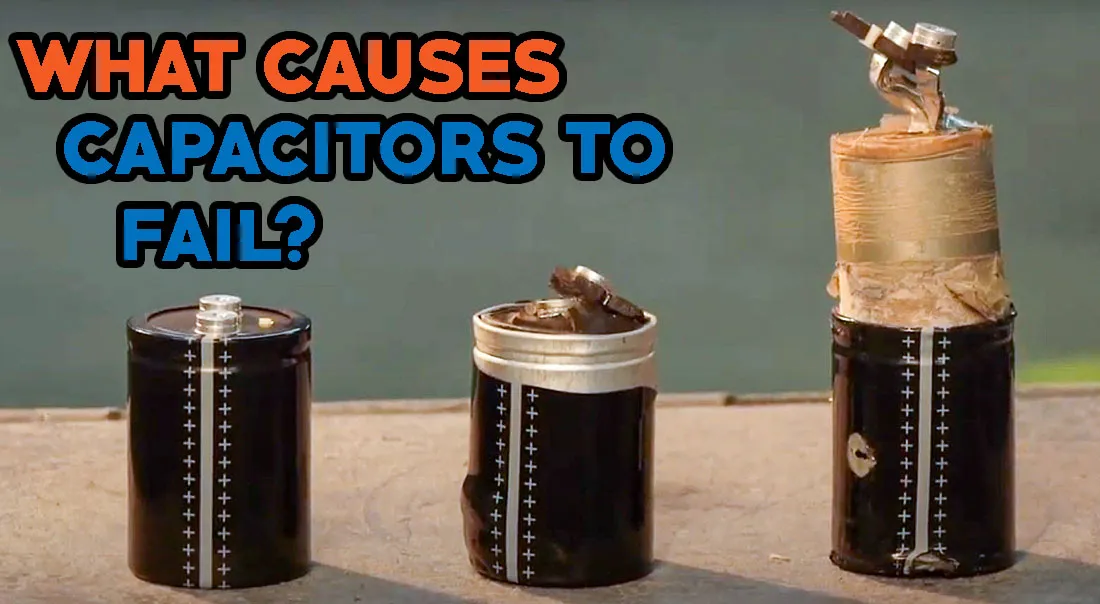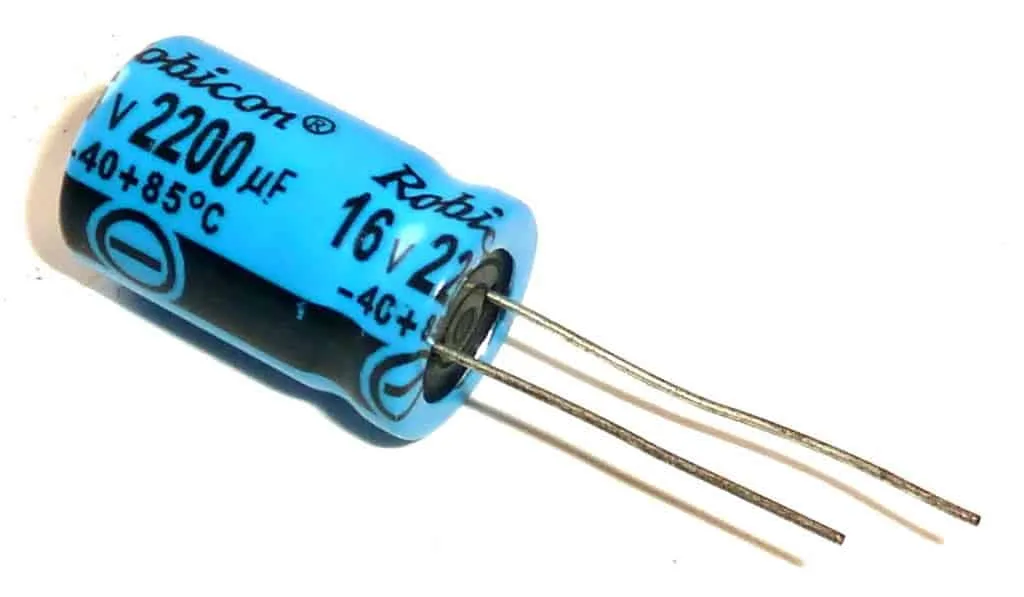What Causes Capacitors to Fail

What Causes Capacitors to Fail
An electric charge is stored in a capacitor. Often necessary for a circuit's proper operation, they are commonly found in electronic circuits. The causes of capacitor failure can be a number of factors, but understanding them is necessary for preventing them. This article provides some tips for preventing capacitor failure and discusses What Causes Capacitors to Fail. So without wasting more time, let's get started!
What is Capacitor and its Construction?

What is Capacitors
An electric charge can be stored in a capacitor. A capacitor has a much smaller energy storage capacity than a similar-sized battery, about 10 000 times smaller, but is still useful in a wide range of circuits.
Capacitor Construction
A dielectric material separates two metal plates during capacitor construction. Metals, such as aluminum, tantalum, or tantalum alloys, are usually used as the conductive plates, while dielectric materials, such as glass, ceramic, or paper, can be used as insulating materials.
The permittivity of the capacitor dielectric is directly correlated with the surface area of the plates. Surface area of the plates determines the permittivity of the dielectric capacitor. Having said that, let's now examine how capacitors work.
What Causes Capacitors to Fail?
Capacitors blow for several reasons:
The sun can cause them to overheat (rooftop units are especially susceptible).
This usually happens during the summer when the unit is running too long and hard.
Electric grid fluctuations (including power surges)
There is a lightning strike
As they age and are used, they wear out
It is imperative that you replace your capacitor as soon as you suspect it may be failing. It can be very costly if you run your unit with a faulty capacitor. Motors or compressors can be destroyed by a dead capacitor, and the whole unit could fail.
Types of Capacitor Failures
Every electronic component, including capacitors, has the potential to fail. Electronic devices that are powered by capacitors can experience issues when they fail. Some devices may even stop working altogether as a result of this issue.
Open Capacitors
Capacitor failures due to open circuits are also common. A capacitor's plate detaches from the other when one of the plates becomes detached. Depending on the type of defect, it may be caused by corrosion, physical damage, or a manufacturing defect.
Usually, open capacitors need to be replaced as they are irreparable. Capacitors can be damaged completely if they undergo too much physical stress. A new capacitor would be better in this case than discarding the old one.
Dielectric breakdown
It is common for capacitors to fail due to dielectric breakdown. It is possible for current to flow into the capacitor when the insulation between the plates breaks down. Voltage spikes, excessive heat, and physical damage can cause an overload of a capacitor.
Capacitors that suffer from dielectric breakdown should be replaced once they have occurred. If the capacitors are not severely damaged, some types can be repaired. A qualified electronics technician can test and replace your capacitor, if necessary, if you suspect it has suffered from dielectric breakdown.
What Causes Capacitors to Fail: Top Factors
Here are some factors that may cause capacitor damage, now that we have covered the two most common types of capacitor failure. The number is actually quite high:
High Temperature
Any electronic component can be damaged by high temperatures, which are obvious. Due to the fact that capacitors often need to operate at extremely high temperatures, this is especially true.
It is important to avoid exceeding the maximum operating temperature of the capacitor in order to prevent this type of damage. Secondly, keep the capacitor cool by using thermal management techniques. A good airflow area could include placing the capacitor near a heatsink or using a heatsink.
Radiation
Radiation can damage or destroy capacitors, although it is less common than other causes. Aerospace and military capacitors are usually the ones that suffer from this capacitor problem. It is known as a single event upset (SEU) that damages capacitors most commonly. Cryogenic rays can damage capacitor dielectric materials. Ultimately, this can result in polarization of the material, which will cause the capacitor to fail.
Vibration and Shock
In addition to vibration and shock, capacitors can be affected by their reliability. A capacitor can still be damaged by excessive vibration or shock, regardless of its design.
Shipments, installations, and operations can all cause this. An increase in leakage current or a loss of capacitance can result from minor vibrations of the capacitor. A capacitor can even fail catastrophically as a result of vibration in extreme cases. Tools and other objects can also damage capacitors, which are susceptible to impact damage.
Barometric Pressure
Another factor of What Causes Capacitors to Fail is barometric pressure. There is the possibility that barometric pressure could affect capacitor reliability. A particular location's atmospheric pressure is described by this parameter. Capacitors' internal components can be stressed when pressure changes, resulting in failure. In environments where barometric pressure is unpredictable, capacitors need to be rated to cope with the range of pressures they might encounter.
Total Lifespan
The lifespan of a capacitor is the same as that of any other electronic component. Aluminum electrolytic capacitors dry out and eventually fail due to evaporation of electrolyte.
Depending on the type of capacitor and the conditions of use, the amount of time it takes to happen varies. An ideal capacitor can last for years if it is used under low temperatures, low humidity, etc. When exposed to harsh conditions like high temperatures or humidity, a lower-quality capacitor may only last a few months.
Insulation Resistance
Capacitor dielectrics resist current flow when a current is passed through them (the insulator). Dielectric materials can break down if they have a low insulation resistance. Therefore, a short circuit will eventually lead to the capacitor's failure.
Low insulation resistance in capacitors can be caused by a few things. Among them are dust or other contaminants that contaminate the dielectric material. The dielectric material can also deteriorate over time if exposed to high temperatures. The resistance to voltage can also be reduced by voltage stress. The dielectric material of a capacitor can become so strong that it causes current to flow when exposed to a voltage that exceeds its rating.
Faqs
Question 1: When a capacitor fails, what happens?
Answer: The motor circuit is always equipped with a run capacitor, which saves energy. It is possible for a motor to be unable to start, overheat, or vibrate when the run capacitor fails. Incorrectly operating motors are caused by faulty run capacitors.
Question 2: What are the signs of a damaged capacitor?
Answer: Capacitance mode should be selected on the multimeter with probes connected to the capacitor. Once you have the value of the capacitor, you can compare it with what you expected it to be. Good if it falls between 10-20%, bad if it doesn't.
Question 3: When a capacitor is wrong, what happens?
Answer: It is possible for the magnetic field of the motor to be unbalanced if the wrong run capacitor is installed. At those spots where the rotor is uneven, it will hesitate. When the motor experiences hesitation, it becomes noisy, consumes more energy, loses performance, and overheats.
Question 4: Do capacitors pop when they fail?
Answer: To a certain extent, that insulation is dielectric. It is possible for a capacitor to explode if a voltage greater than its rated value is applied across it.
Final Thoughts
Any electronic device relies heavily on capacitors, and failure of these components can be disastrous. As we saw in this article, capacitor failure is often caused by a combination of factors, and it's also preventable with some tips. Capacitors can fail for a variety of reasons. I hope you all have your confusion cleared after reading our article which is about What Causes Capacitors to Fail.
I Have explained each and everything in detail. So if you still don't know how to prevent capacitor failure then you can ask any questions in the comment section. Thank You!
Related Articles
Inductor vs Resistor: What’s the Differences?
Understanding Coupled Inductors: Operations and Practical Applications
CBC3225T102KR Inductors: Features, Specifications, and Datasheet










